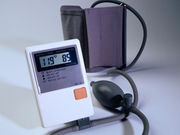OBP30 is associated with lower blood pressure readings than office BP in all patient groups
FRIDAY, March 24, 2017 (HealthDay News) — Automated office blood pressure monitoring during 30 minutes (OBP30) is associated with a reduction in mean diastolic blood pressure, and may reduce overtreatment of white-coat hypertension, according to a study published in the March/April issue of the Annals of Family Medicine.
Michiel J. Bos, M.D., Ph.D., and Sylvia Buis, M.D., M.P.H., from Gezondheidscentrum Ommoord in Rotterdam, Netherlands, enrolled 201 consecutive patients who underwent OBP30 for medical reasons over a six-month period in a single primary health care center. Patients’ OBP30 results were compared with their last preceding routine OBP reading.
The researchers found that, compared with the mean diastolic OBP, the mean diastolic OBP30 was 11.6 mm Hg lower. Patients with and without suspected white-coat hypertension had considerable differences between OBP and OBP30; the differences were greater among those aged 70 years or older. In 79.1 percent of studied cases, physicians said that they would have started or intensified medication therapy based on OBP alone. With the results of OBP30 available, medication therapy was started or intensified in 24.9 percent of cases.
“OBP30 yields considerably lower blood pressure readings than OBP in all studied patient groups,” the authors write. “OBP30 is a promising technique to reduce overtreatment of white-coat hypertension in primary health care.”
Copyright © 2017 HealthDay. All rights reserved.








